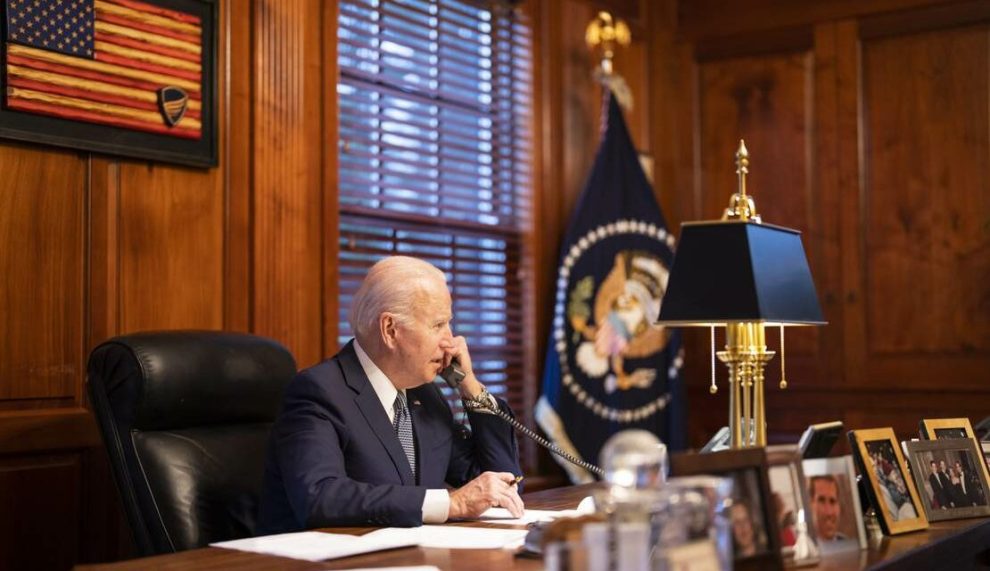Fears over over Vladimir Putin’s threatened invasion of Ukraine continue to grow despite the fact that the effort would burst both Russia’s military and economy, not to mention ruining its foreign relations. Swallowing a poison pawn makes so little sense that UK Prime Minister Boris Johnson says Russia’s Putin may be “irrational,” unable to act in his own best interests. Yet it is not only the Kremlin’s behavior that has a bizarre feel to it. Despite decrying the seriousness of the situation, Western governments aren’t obviously readying for a European conflict. Instead they are focusing on masks, mandates and invoking war powers to force truckers to comply with soon to be abolished Covid vaccine requirements. One would think the southern border would be secured, oil stockpiled, and STEM not CRT taught in reopened schools. But none of this is happening.
Perhaps as in so many cases in history the bite is in the bark; and in this case the bark is quite real. Putin has created an “invasion-in-being.” In naval warfare, the analogous concept of a “fleet in being” is a force that projects menace without ever leaving port. Were it to fight it might lose and no longer influence but while it remains in port, one is forced to guard against it. “The German battleship Tirpitz served her entire career as a ‘fleet in being’ in her own right. Although she never fired a shot at an enemy ship, her mere presence in the Norwegian fiords forced the Royal Navy and their allies to allocate powerful warships in defending Arctic convoys, and caused a major convoy [PQ 17] to scatter, suffering huge losses, mainly to U-boats and aircraft.”
Putin has been doing the same thing on land. His armies are essentially “in port” — inside Russia or the Kremlin’s client states. Meanwhile Ukraine and the West are in an uproar, evacuating their citizens, canceling airline flights — never enjoying a moment’s mental security. Yet Putin can keep the invasion-in-being poised and the resulting disruption going indefinitely. The only way to destroy an invasion-in-being is to neutralize it in staging, in this case with sanctions, by a date certain if it does not disperse. Otherwise there is no way of telling whether this or that stand-to is the real thing because to be credible, it must always be potentially real.
Being an ex secret policeman, Putin knows much of his menace comes from unpredictability. The public can tolerate ordinary police because they know what the rules are and do not anticipate a midnight knock on the door. As with secret police, Ukraine and the Western public don’t know what the rules are. They are hanging on the caprice of a seeming madman, who curiously keeps going to the brink without crossing it for good reason; if he actually invades in a recognizable way the uncertainty is removed and the West knows what to do about aging overreaching dictators who’ve started something they can’t afford. By preserving ambiguity Putin has Biden spellbound, on the one hand reportedly convinced it’s on. “The President was very clear that he is convinced by U.S. intelligence that this invasion will happen, that President Putin decided to do it, … ‘Because the intelligence says that Russian troops have actually received orders now, to proceed with the invasion,’ CBS News correspondent David Martin said.”
On the other hand, Biden seems to think Putin can still be talked out of it. The wires announced a breakthrough summit brokered by French President Emmanuel Macron in which “President Biden has agreed ‘in principle’ to meet with Russian President Vladimir Putin in the near future, provided Russia has not invaded Ukraine, the White House announced.” Taking all the elements together it seems, according to a former White House adviser, that “ultimately Putin wants some kind of deal. They think Biden is the kind of president who could actually make a deal. Trump never could.” Perhaps Putin’s first choice in the Ukraine crisis was always a deal. He ramped up the geopolitical tension and held out until there was enough sweetener in the pot to make it worth his while.
Already Putin has begun what the New York Times calls “a carefully choreographed day of building drama over the fate of Ukraine”. In the short term buying Putin off is “good” because it averts war. But in the longer run it solves nothing because Putin will be back once he’s burned through the loot he anticipates getting from the West. Ironically Putin may even front load his demands to compensate for the possibility political checks made out by Biden dated “2023” and “2024” might bounce owing to electoral misfortune.
The problem of distinguishing between threat and creeping fulfillment was highlighted by Moscow ordering troops to Ukraine’s breakaway regions after Putin recognized their independence. Will Biden consider this an invasion or a “minor incursion”? Perhaps it is a distinction without a difference. Biden was conditioned into assuming the threat was in the future, in one big throw for Kiev. But if the invasion-in-being was always the real threat, the threatened sanctions should have been triggered long ago. It should have been about being nickle and dimed to death; about what Putin has gotten away with already.
Books: You Will Be Assimilated: China’s Plan to Sino-form the World by David Goldman. China’s 5,000-year-old empire has become the world’s largest economy, with a plan to control the decisive technologies of the 21st century—and the United States is in danger of being left behind. America has finally recognized China’s bid for world dominance—but we’re still losing ground. Domination of the next generation of mobile broadband is just the tip of the spear. Like the Borg in Star Trek, China will assimilate you into a virtual empire controlled by Chinese technology. China is taking control of the Fourth Industrial Revolution—the economy of artificial intelligence and quantum computing—just as America dominated the Third Industrial Revolution driven by the computer.
Story cited here.
























